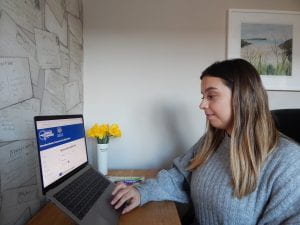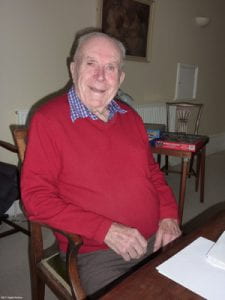Editors’ note
Tilly Foster has started volunteering with the IBCC Digital Archive in 2019. She has gone from strength to strength, learning new skills and gaining industry-specific insights in the process. She’s currently managing a team of dedicated volunteers producing summaries of oral history interviews available. As a consequence, usability has significantly improved, and life stories are now fully discoverable. We welcome her first contribution as guest blogger with an insightful piece on reflective practice; needless to say, we wish Tilly every success in her career.
The editorial team
I first visited the International Bomber Command Centre in 2019 and as a public history student, I was most intrigued by the thoughtful approach to the divisive nature of Bomber Command through recognition, remembrance, and reconciliation. After completing my MA in September 2020, therefore, the IBCC was my top choice to approach with the hope of gaining practical experience in the heritage sector through volunteering.

Tilly Foster
Luckily, as the archive is completely digital, I was able to begin immediately after expressing my interest. My first task was to listen to a variety of oral history interviews and produce concise, user-friendly abstracts to accompany these on the archive.
This allowed me to transfer my existing academic writing skills while also complying with the in-house rules and maintaining an objective tone. After completing a few abstracts, I was trusted to upload these directly to the archive myself.

Jack Harris. The summary of his interview was one of the first pieces of work produced. https://ibccdigitalarchive.lincoln.ac.uk/omeka/collections/document/16650
In January 2020, I was offered the chance to take on additional responsibility as a volunteer coordinator, leading a small group of other volunteers producing oral history abstracts. This involves assessing the audio quality of interviews and allocating them appropriately to volunteers based on their skill, proofreading and uploading written submissions, and communicating helpful feedback.
The most challenging aspect of this role has been editing and providing appropriate feedback to the volunteers. My academic background has trained me to edit written work thoroughly. So, when my supervisor provided a practice abstract to edit and give feedback, I channelled my academic training and edited it to my usual standard, explaining the reasons behind each change. My supervisor warned me that despite my good intentions, this approach may come across as somewhat harsh to volunteers. Instead, they explained that it was important to be more encouraging to keep the experience enjoyable for volunteers, thereby safeguarding the important work they’re contributing to the archive. I immediately recognised how my initial feedback could be taken in the wrong way and altered my approach. I have since transitioned to using a ratio when feeding back to my team, incorporating three things done well and one suggestion of how to improve next time.
In this role, I have been able to work on practical leadership and management skills that aren’t taught at university. Most importantly, I’ve learnt to consider who I’m providing feedback to and then alter the content accordingly. There is a difference between proofreading a friend’s university essay under the instruction to be as honest as possible and providing constructive feedback to a volunteer who has opted to offer their valuable time to the archive. Volunteers are the backbone of heritage institutions, so it is incredibly important to keep them on board. As I hope to pursue a career within the heritage sector, I’m grateful to the IBCC for giving me the chance to learn this lesson early on.
Tilly Foster
